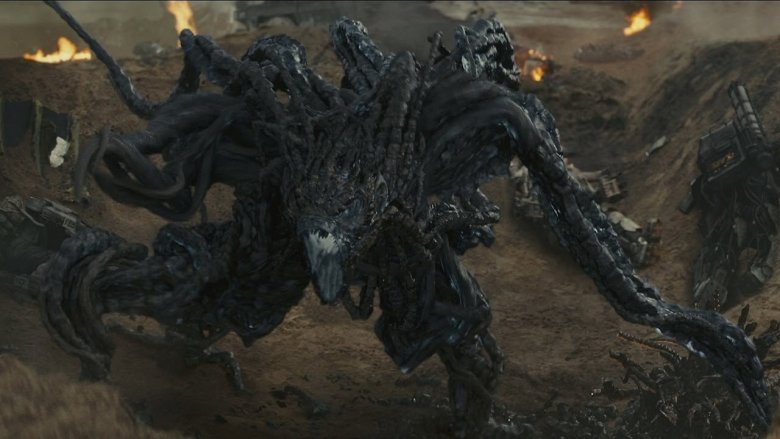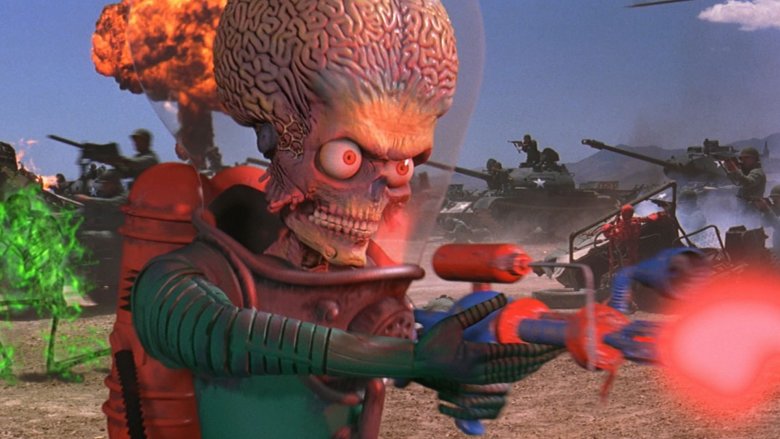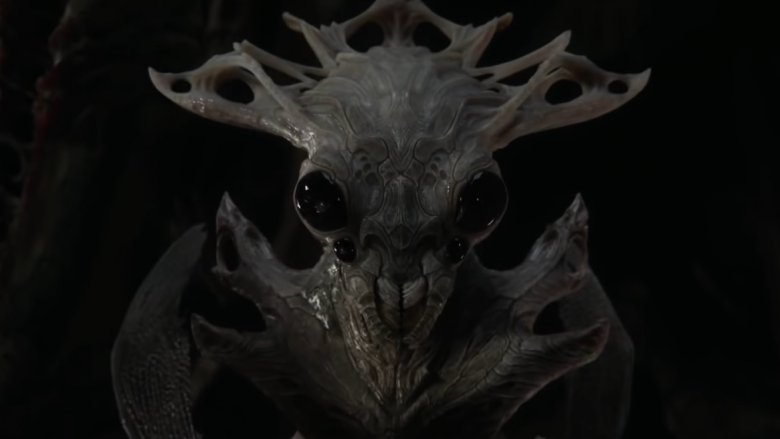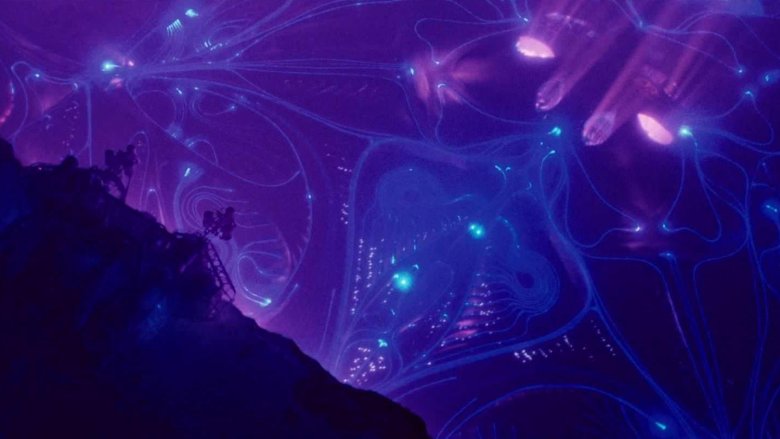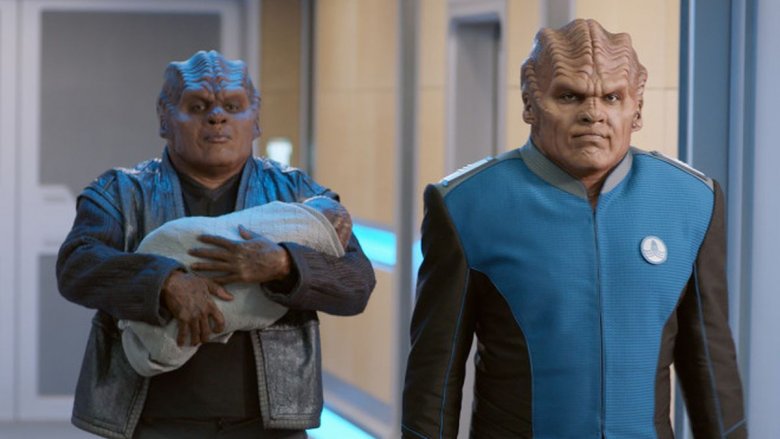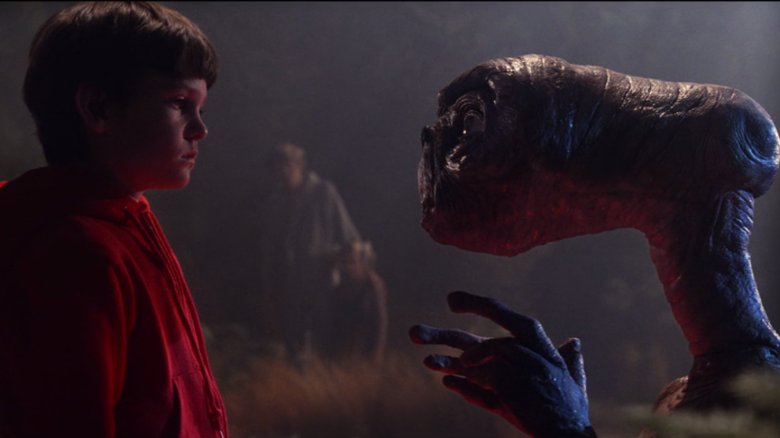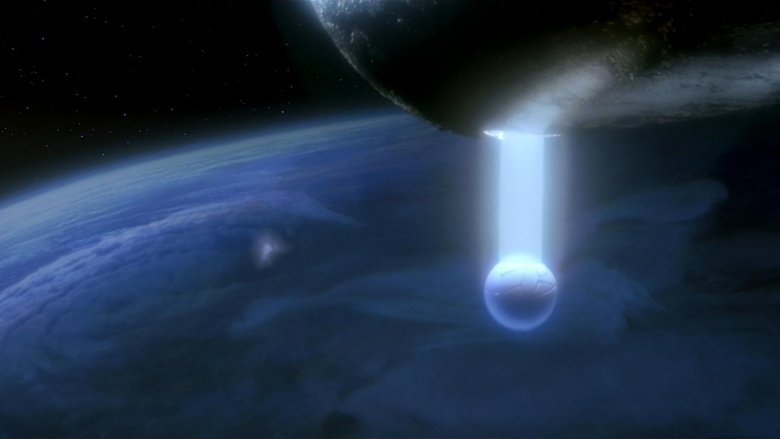Questions That Alien Movies Never Answer
The question of whether or not we're alone in the universe has captured the imagination of Hollywood for more than a century, beginning with the 1902 silent film A Trip to the Moon and continuing through more recent alien movies such as Men in Black: International and Captain Marvel. Over the past hundred-plus years, aliens have invaded nearly every genre of storytelling. From the fantasy of Star Wars to the horror of Alien, from adrenaline-pumping thrillers like Independence Day to quiet, contemplative dramas like Arrival, we can't seem to get enough stories about little green men (or giant, horrifying monsters) from outer space.
However, despite the multitude of alien films that now exist within the pop culture lexicon, there are a few questions that most movies about extraterrestrials tend to either handwave away or ignore entirely. Below are some of the most perplexing questions that are often left unanswered in films featuring intergalactic travelers.
Why do the creatures in alien movies always look so familiar?
In some alien-populated franchises such as Star Trek and the Marvel Cinematic Universe, the aliens tend to look mostly human with a few minor alterations. Maybe their skin is green, or they have pointed ears or ridges on their face, but for the most part, their features and anatomy are extremely similar to ours. However, even in films featuring less humanoid aliens, they're not nearly as removed from Earth-based species as we might think. Consider the xenomorph from Alien, the prawns from District 9, or E.T.'s race of peaceful explorers. They may not look human, but they still seem to have evolved similarly to species here on Earth, with one head, a face, a torso, and distinguishable arms and legs.
A few films like Cloverfield or Super 8 tried their best to reimagine aliens so they didn't resemble humans quite so closely, but even then, it's hard to find an example of an alien species in film that doesn't call to mind Earth-based animals, insects, or sea life. It's understandable, since after all, humans are both the creators and consumers of alien films, and Earth is the only frame of reference we have. But we're all going to have our minds blown when we learn someday that there is sentient life in the universe, but that aliens are actually made of ... who even knows. Maybe sound waves or something.
Why do aliens always want to terraform Earth?
Whether it's the aliens in Independence Day using our own satellites against us, or the aliens in Edge of Tomorrow sending their collective consciousnesses back in time in order to defeat us, militaristic aliens seem to constantly be invading Earth with the intent of wiping out humanity so they can have our planet all to themselves. But why do this when there are countless other worlds out there that aren't already teeming with sentient life that needs to be exterminated? Why do these aliens insist on moving into a roach-infested foreclosure with stubborn tenants that need to be evicted when there's an empty, bug-free house right across the street?
Consider that by the time aliens get to our planet, they've already mastered interstellar travel. Plus, they've got to have a plan in place for modifying Earth to their liking once they've gotten rid of humanity. With such advanced technology, terraforming an unoccupied Mars instead of the far more labor-intensive Earth seems like it should be a piece of cake.
Why can aliens procreate with humans?
Ever since the half-human, half-Vulcan Spock made his first appearance in Star Trek, alien-human hybrids have been all the rage in stories about humanoid space invaders. From Deanna Troi of Star Trek: The Next Generation to Peter Quill of Guardians of the Galaxy fame, these half-alien characters have been popping up in alien movies and TV shows for decades, often presenting as mostly human, but with enhanced abilities that speak to their alien heritage.
But how are aliens and humans genetically compatible enough to produce offspring? Scientists haven't even reached a consensus on whether it's possible to breed humans with chimpanzees, and their DNA is 95 percent similar to ours, and they share 99 percent of our DNA coding sequences. It seems like it would be a safe bet that we'd have less in common with a species that evolved on a completely different planet than we do with chimps, yet these human-alien pairings are constantly producing on-screen offspring.
What's interesting, and heartbreaking, about many real-life interspecies hybrids is how many biological challenges they tend to face, including infertility, birth defects, and heart problems. If this is true for genetically-similar Earth species, imagine just how much more of an issue it could be when trying to blend human genetic material with that of an extraterrestrial species. We don't often see these unfortunate consequences in sci-fi stories about alien-human procreation, but it sure would be an interesting path to explore.
Why aren't aliens weaponizing faster-than-light travel?
Not every alien species has hyperspeed, but the ones that do are really wasting their time sending entire armies to eradicate life on other planets when they could just send one relatively small but super-fast projectile. Star Wars: The Last Jedi uses what fans have dubbed the "Holdo Maneuver" to wipe out a fleet of First Order ships, but why stop there? One probe sent ahead of the alien fleet at relativistic speeds could cause an extinction-level event similar to what some scientists believe was responsible for the end of the dinosaurs. Sure, it could take life on Earth a while to die out following impact, but the aliens could time their arrival for when the literal dust had settled and humanity was mostly dead, and then just pick off the stragglers. That sounds like a far more efficient method for getting a human-free planet than global war does.
And if the goal is total destruction and not eventual colonization, it gets even simpler. A probe of the right size, traveling at the right speed, could tear through a planet, just like how Holdo ripped through those Star Destroyers. Imagine if someone had told the Emperor that he didn't need a moon-sized planet killer after all, and that a single ship with a hyperdrive could've easily taken out Alderaan. The Star Wars franchise would've been over a whole lot sooner.
Why do alien weapons always blow stuff up or disintegrate it?
No matter how weird and wild an alien species is, their weapons tend to be pretty uninspired, most often resembling some version of a gun. Plus, they almost always tend to shoot out blasts of energy that cause their target to explode, get reduced to atoms, or turn into skeletons, like the space rifles in Mars Attacks! While laser blasters have shown to be pretty effective against humans, it's a little bizarre that alien weaponry functions so similarly to our own.
After evolving totally independently from us, on a completely different planet, it makes sense that aliens would hold a vastly foreign idea of what constitutes an effective weapon. Maybe the weapons they created would convert things into a useful resource or absorb their targets as energy. Maybe they'd send them into a parallel dimension, dehydrate them like a raisin, or super-hydrate them until they exploded like an over-full water balloon. Explosions are cool and all, but surely that's not all that the universe has to offer.
Why do we never notice alien spaceships until they're right on top of us?
Often in alien invasion movies, the first sign of otherworldly visitors occurs when their ship either crashes into Earth, such as in the original War of the Worlds, or when aliens are spotted dwelling among us, like in Signs. But considering just how many space telescopes and observatories we have devoted to recording and analyzing celestial events, it seems a little strange that we're always taken by surprise when extraterrestrial ships seem to appear out of nowhere and blow up our monuments, a la Independence Day.
After all, these aliens likely had to travel millions or even billions of light years in order to reach our planet, often in spaceships the size of cities. Outer space is a big place, so it's absolutely conceivable that aliens could occasionally creep up on us, but the odds are good that we should be spotting them when they're still a good distance away, at least some of the time. Every now and then, it could be fun to watch a film that explores what happens when humans have months to prepare for an imminent alien invasion.
Why do alien species have one planet-wide civilization and culture?
Here on Earth, we take it for granted that humans have divided ourselves into hundreds of countries and cultures, and that humans are infinitely variable in the ways that we see the world and move through our lives. Yet when it comes to aliens, their homeworlds are often depicted as pretty monolithic, with only one planet-wide race or culture. Sometimes, in stories such as the Transformers franchise, there may be two or three factions on a planet that are at odds with one another, but almost never do we see alien homeworlds depicted as having the same sort of vast diversity that we do here on Earth.
Perhaps alien societies wouldn't be broken up by economic class, governing systems, religion, or race, but it seems likely that they'd be divided somehow. Even if it's totally foreign to how we split ourselves up here on Earth, surely an alien species spanning an entire planet would find a way to divvy themselves up into more manageable groups. They can't all be the Formic hive from Ender's Game.
Why do aliens keep invading Earth with the intent of living on the surface?
With the exception of the aliens in The Abyss, most of the times when extraterrestrials arrive on Earth, they seem determined to either live among us or completely replace us as the dominant species on the surface. However, over 70 percent of the Earth's surface is covered by water. So we've got to ask, why are so many land-dwelling aliens choosing Earth as their new digs? Shouldn't a planet that's mostly water be attracting far more aquatic aliens than terrestrial ones?
Even in Pacific Rim, in which the kaiju emerge from interdimensional cracks at the bottom of the ocean (making them technically aliens, even if they don't necessarily hail from a different planet), their ultimate destination seems to be the mainland. Why not simply live in the ocean, where there's plenty of food and practically zero territorial competition? Surely an alien species that's capable of taking on human arsenals can handle a few sharks and whales.
Why do aliens tend to conform to a gender binary?
Not every alien movie deals with sex and gender, but the ones that do tend to conform to the same binary designations that exist here on Earth. Even in shows like Star Trek or The Orville that explore ideas such as matriarchal or single-gender societies, their characters will still most often fall into either male or female categories.
While it's true that most species on Earth can be split into two groups according to sex, why would we presume that aliens would be the same way? Even among humans, strict adherence to a binary definition of gender is becoming less prevalent the more we learn about gender identity. So why would the biology and social structure of alien races be even more rigid than ours when it comes to sex and gender? For every alien race that can be broken down into simple groupings of "male" and "female," there should probably be way more extraterrestrial species that have more genders, different genders, or no concept of gender at all.
Why do aliens never seem awed to discover new life?
With the exception of E.T., most alien films depict extraterrestrial visitors getting straight to business when they arrive, without first pausing to look around and appreciate their surroundings. Whether they come to colonize us, exterminate us, or study us, it's the rare alien film that portrays the visiting species as even vaguely curious about this new planet they've discovered and its myriad of lifeforms. When the shoe is on the other foot and it's humans traveling to a new planet with sentient life, there's always a period of excited discovery and exploration (often right before everything goes pear-shaped). So why aren't aliens as enthusiastic about learning about us as we would be to learn about them?
Maybe by the time they reach Earth, every single alien species has become the equivalent of a kid on a cross-country car ride, refusing to look at the beautiful scenery outside the window because they're so preoccupied with the question of, "Are we there yet?" Or perhaps most aliens have already visited so many other populated planets that we're no longer all that interesting — if, in fact, we ever were.
Why are aliens always so interested in humans?
Humans have always had a tendency to view ourselves as the most important species on the planet, if not the universe, but what if we're not? With the exception of Star Trek IV: The Voyage Home, which sees an alien probe travel to Earth intent on re-establishing contact with humpback whales, aliens are nearly always focused on humans. Some want to attack us, while others hope to communicate with us, but almost never do they ignore us entirely.
Sure, on Earth, humans evolved to be the dominant species on the planet, but maybe on another planet, the dominant species might've evolved to more closely resemble cats, lizards, or pigs. Where are the ships full of extraterrestrial canines that have traveled millions of miles to converse with dogs, determined to help them realize their full potential? Where are the films about alien avians coming to rally legions of birds to their cause? What if when aliens finally came to Earth, instead of asking us to take them to our leader, they bypass us entirely and start negotiating with cows?
It's easy enough for films to gloss over these sorts of conundrums. After all, science fiction has been sweeping questions like these under the rug for more than a century now. But the next time a sci-fi film lands in theaters, try to imagine what it would be like if alien movies faced these issues head-on, instead of ignoring some of the genre's most perplexing possibilities.


